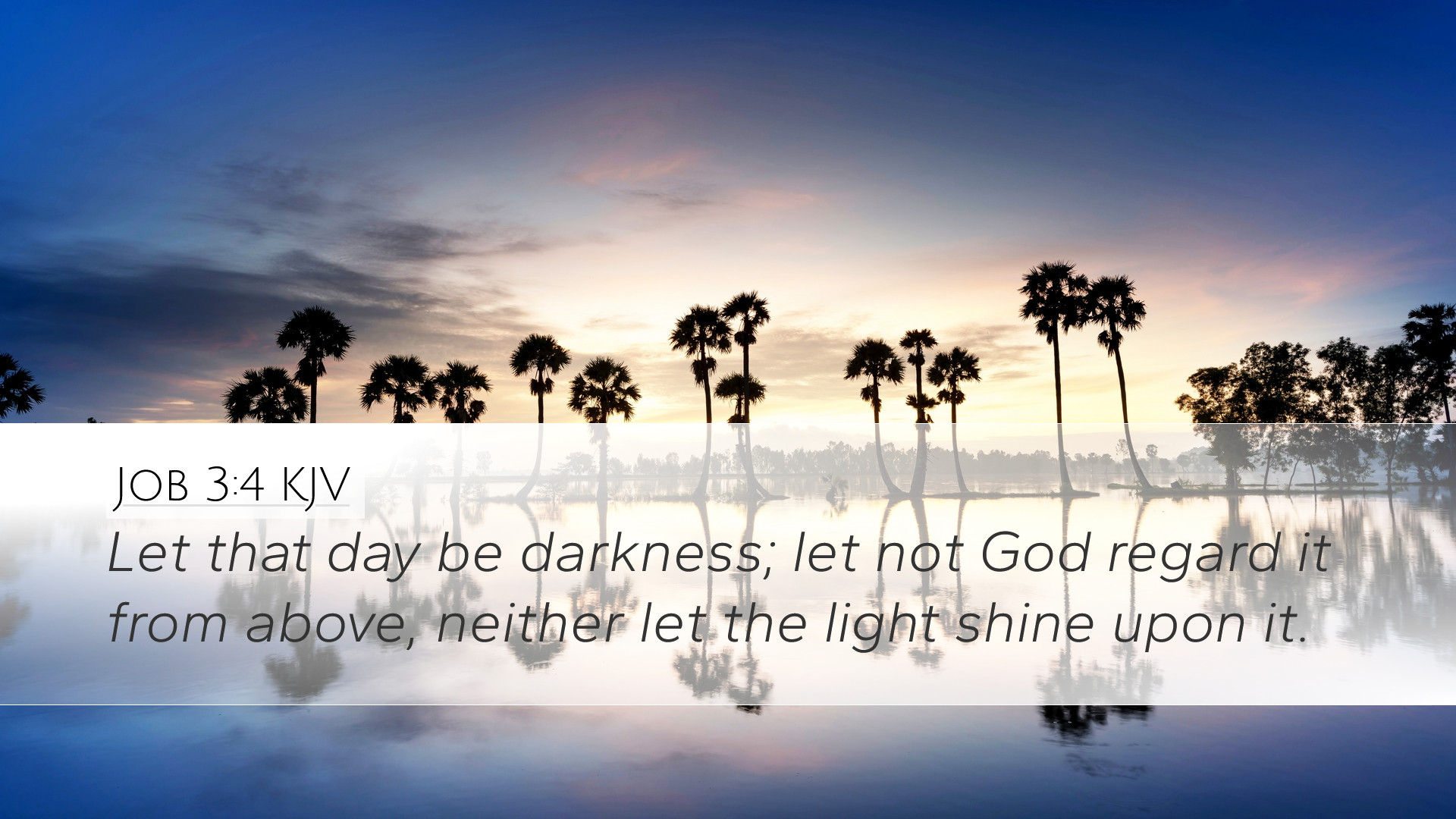Old Testament
Genesis Exodus Leviticus Numbers Deuteronomy Joshua Judges Ruth 1 Samuel 2 Samuel 1 Kings 2 Kings 1 Chronicles 2 Chronicles Ezra Nehemiah Esther Job Psalms Proverbs Ecclesiastes Song of Solomon Isaiah Jeremiah Lamentations Ezekiel Daniel Hosea Joel Amos Obadiah Jonah Micah Nahum Habakkuk Zephaniah Haggai Zechariah MalachiJob 3:4
Job 3:4 KJV
Let that day be darkness; let not God regard it from above, neither let the light shine upon it.
Job 3:4 Bible Commentary
Commentary on Job 3:4
The verse Job 3:4 states: "Let that day be darkness; let not God regard it from above, neither let the light shine upon it." This encapsulates Job's profound despair and his wish for the day of his birth to be obliterated from memory. In examining this verse, we draw insights from the public domain commentaries of Matthew Henry, Albert Barnes, and Adam Clarke.
Contextual Understanding
Job's lamentation arises as he confronts the enormity of his suffering. Public domain commentaries suggest noting the transition from his previous state of prosperity and joy into profound anguish. The context of this verse is critical for understanding Job's psyche as he grapples with the incomprehensible nature of his afflictions.
Matthew Henry's Insights
Matthew Henry identifies the day of Job's birth not merely as a temporal marker but as a symbol of all that Job now despises in his current existence. He reflects on the particular intensity of Job's grief and highlights that Job wishes that the day never occurred. Henry states that this reflects the depth of sorrow Job experienced and illustrates how despair can warp one's perception of life’s earlier joys.
- Desire for Darkness: According to Henry, Job’s wish for darkness signifies a yearning for oblivion—the absence of both light and joy that once illuminated his life.
- Divine Indifference: Henry emphasizes that Job's lament includes the plea that God should not regard his birth, expressing a sense of rejection that intensifies Job’s despair.
Albert Barnes' Analysis
Albert Barnes offers a detailed exegesis focusing on the emotional turmoil manifested in this verse. He notes that Job's plea for darkness reflects the anguish of a soul crushed by affliction and the feeling of abandonment. Barnes elaborates on the metaphoric meaning intertwined in Job's discourse.
- The Significance of Light: Barnes interprets 'light' as representative of life, joy, and divine favor. Job's wish for its absence reveals his despair at their loss.
- Theological Implications: Barnes suggests that Job’s words challenge common theological assumptions about God's providence and oversight. In his suffering, Job feels distanced from God's watchful presence, which he once enjoyed.
Adam Clarke's Perspective
Adam Clarke approaches Job 3:4 by unpacking the psychological dimensions of Job's lament. He emphasizes the internal struggle Job faces as he voices his thoughts to God regarding his suffering and the bitter memory of his birth.
- Cultural Context: Clarke places Job’s lament within the cultural understanding of birth and existence at the time. He notes that ancient Near Eastern thought often viewed birth as a divine blessing, making Job’s sorrow more poignant.
- Job’s Isolation: Clarke notes that Job's isolation in his grief and suffering highlights the human condition's fragility. He shows how Job's cry resonates with those who face suffering without understanding its purpose.
Thematic Reflections
Several themes emerge from Job 3:4 that are significant for pastors, theologians, and Bible scholars. These themes include the nature of suffering, the quest for meaning, and human emotions when faced with tragedy.
- The Nature of Suffering: Job’s lament provides a poignant exploration of human suffering. It invites deeper theological reflection on the reasons behind suffering and divine justice.
- The Quest for Meaning: Job's desire for darkness speaks to the universal human desire for understanding in the midst of despair—a theme that many grapple with in both biblical and contemporary contexts.
- Human Emotion: The raw emotion depicted in Job's lament acts as a reminder of the legitimacy of sadness and the need for community support, thereby encouraging pastoral care and compassion for those in distress.
Conclusion
In Job 3:4, we find not only a remarkable expression of human despair but also an invitation to explore the deeper theological implications of suffering, isolation, and the human condition. Insights from Matthew Henry, Albert Barnes, and Adam Clarke weave a rich tapestry of understanding that serves both pastors and scholars in their reflections on this pivotal moment in biblical literature. As we engage with Job's lament, we are led to consider our own responses to suffering and the complex reality of God’s relationship with humanity amidst pain.


